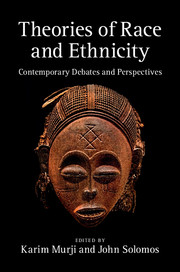Book contents
- Frontmatter
- Contents
- Notes on contributors
- Preface
- 1 Introduction: situating the present
- Part I Debates
- Part II Perspectives
- Introduction to Part II
- 8 Superseding race in sociology: the perspective of critical rationalism
- 9 Critical race feminism
- 10 Performativity and ‘raced’ bodies
- 11 Racism: psychoanalytic and psychosocial approaches
- 12 The sociology of whiteness: beyond good and evil white people
- 13 (Sexual) whiteness and national identity: race, class and sexuality in colour-blind France
- 14 Racial comparisons, relational racisms: some thoughts on method
- 15 Conclusion: back to the future
- Index
- References
13 - (Sexual) whiteness and national identity: race, class and sexuality in colour-blind France
Published online by Cambridge University Press: 18 December 2014
- Frontmatter
- Contents
- Notes on contributors
- Preface
- 1 Introduction: situating the present
- Part I Debates
- Part II Perspectives
- Introduction to Part II
- 8 Superseding race in sociology: the perspective of critical rationalism
- 9 Critical race feminism
- 10 Performativity and ‘raced’ bodies
- 11 Racism: psychoanalytic and psychosocial approaches
- 12 The sociology of whiteness: beyond good and evil white people
- 13 (Sexual) whiteness and national identity: race, class and sexuality in colour-blind France
- 14 Racial comparisons, relational racisms: some thoughts on method
- 15 Conclusion: back to the future
- Index
- References
Summary
In 2009, Manuel Valls, then a rising star on the right wing of the French Socialist party who was to become, in 2012, an omnipresent minister of the interior after François Hollande’s election as president of the republic, raised some eyebrows when the television channel Direct 8 released, on 8 June, footage of a racial comment he had made. While touring downtown Évry, a city outside Paris associated in the national imaginary with social and racial tensions, the young mayor sarcastically complained to one of his aides about a flea market run by black immigrants: ‘Such a pretty picture of this town!’ He went on to call for action: ‘Do put in a few Whites’ – or, as he put it in French, for emphasis (with virtuoso linguistic variations), ‘quelques Blancs, quelques Whites, quelques Blancos’.
When asked about these words, characterised by TV journalist Valérie Trierweiler (soon to rise to first lady) as ‘definitely not politically correct’, Valls did not back down: ‘We must bring in social diversity’, that is, make room in the inner city for the middle class, ‘whether of immigrant origin or not’. However, this last comment, though couched in a colour-blind rhetoric that today reconciles in French public discourse Republican universalism and Marxist class, was undermined by the next sentence, which only confirmed the racial dimension of his argument: ‘We need a mix. What has killed part of the Republic is clearly the ghettoisation, the reality of spatial, social, ethnic segregation. A true apartheid has developed that self-righteous people occasionally see blow up in their faces, as was the case in 2005 during the riots in the suburbs.’ Valls concluded, ‘Everyone thinks this way, so we have to say it clearly. While we kept denying problems, we left this issue to others – in particular extremists – thus fueling political despair.’
- Type
- Chapter
- Information
- Theories of Race and EthnicityContemporary Debates and Perspectives, pp. 233 - 250Publisher: Cambridge University PressPrint publication year: 2014
References
- 6
- Cited by



